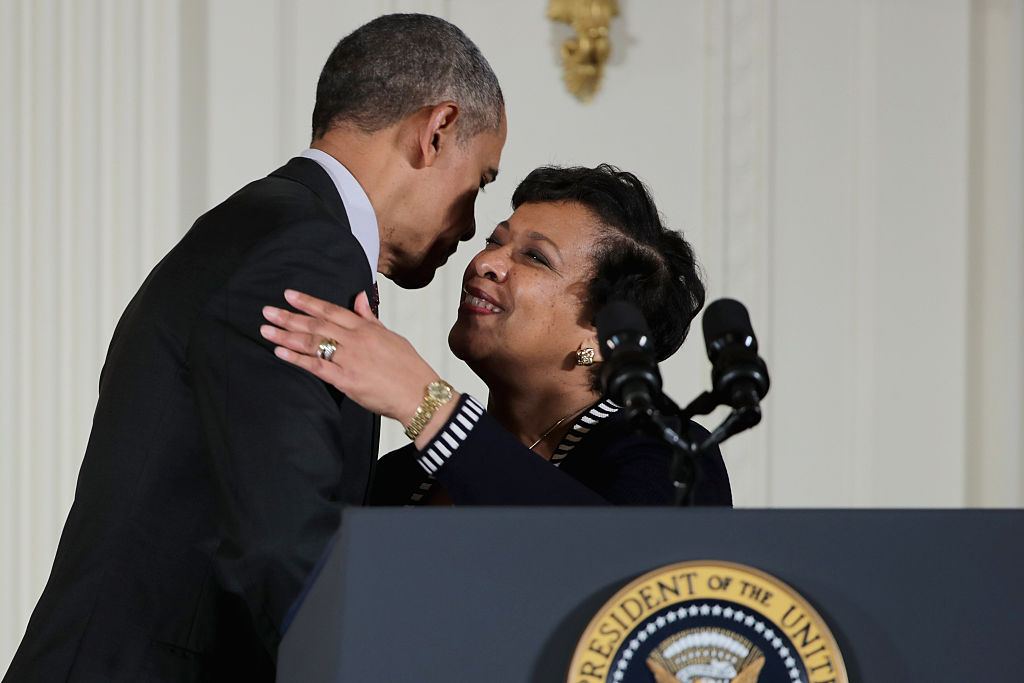Attorney General Lynch reportedly blocked Obama's latest plan to close Guantanamo


A free daily email with the biggest news stories of the day – and the best features from TheWeek.com
You are now subscribed
Your newsletter sign-up was successful
President Obama has faced numerous roadblocks from Republicans preventing him from following through on his pledge to close the U.S. prison camp at Guantanamo Bay, Cuba. But the latest obstacle comes from his own attorney general, Loretta Lynch, Reuters reports, citing senior administration officials. At least twice in the past three months, Lynch has reportedly stepped in to block a proposal to allow certain inmates to plead guilty in U.S. federal court via videoconference — thus averting a ban on Guantanamo inmates coming to the U.S. mainland instituted by congressional Republicans. Those inmates would then be imprisoned in a third country.
Lynch's objections are grounded in the laws and customs of criminal procedures, which Justice Department officials say block both pleading guilty over videoconferencing and also pleading guilty without adequate options. "There were some frustrations," a White House official told Reuters. "The top lawyer in the land has weighed in, and that was the DOJ's purview to do that." The State Department, Pentagon, and defense lawyers for the remaining Guantanamo detainees all back the measure.
Obama has reduced the Guantanamo prison population to 80, from about 240 when he took office, and the White House expects 30 detainees cleared for transfer to be moved overseas in the next few months. Another 10 could be approved for transfer later, and 10 more are being tried in military tribunals. Of the remaining 30 detainees, the White House says that 10 to 20 could be dispatched through videoconference guilty pleas, and with 10 to 20 prisoners being guarded by 2,000 military personnel, Obama might finally win congressional backing for closing the prison. Some of the prisoners in limbo were tortured by the U.S., making their evidence inadmissible in U.S. courts. "The beauty of a guilty plea is you don't need a trial," a senior administration official tells Reuters.
The Week
Escape your echo chamber. Get the facts behind the news, plus analysis from multiple perspectives.

Sign up for The Week's Free Newsletters
From our morning news briefing to a weekly Good News Newsletter, get the best of The Week delivered directly to your inbox.
From our morning news briefing to a weekly Good News Newsletter, get the best of The Week delivered directly to your inbox.
A free daily email with the biggest news stories of the day – and the best features from TheWeek.com
Peter has worked as a news and culture writer and editor at The Week since the site's launch in 2008. He covers politics, world affairs, religion and cultural currents. His journalism career began as a copy editor at a financial newswire and has included editorial positions at The New York Times Magazine, Facts on File, and Oregon State University.
-
 How the FCC’s ‘equal time’ rule works
How the FCC’s ‘equal time’ rule worksIn the Spotlight The law is at the heart of the Colbert-CBS conflict
-
 What is the endgame in the DHS shutdown?
What is the endgame in the DHS shutdown?Today’s Big Question Democrats want to rein in ICE’s immigration crackdown
-
 ‘Poor time management isn’t just an inconvenience’
‘Poor time management isn’t just an inconvenience’Instant Opinion Opinion, comment and editorials of the day
-
 Witkoff and Kushner tackle Ukraine, Iran in Geneva
Witkoff and Kushner tackle Ukraine, Iran in GenevaSpeed Read Steve Witkoff and Jared Kushner held negotiations aimed at securing a nuclear deal with Iran and an end to Russia’s war in Ukraine
-
 Pentagon spokesperson forced out as DHS’s resigns
Pentagon spokesperson forced out as DHS’s resignsSpeed Read Senior military adviser Col. David Butler was fired by Pete Hegseth and Homeland Security spokesperson Tricia McLaughlin is resigning
-
 Judge orders Washington slavery exhibit restored
Judge orders Washington slavery exhibit restoredSpeed Read The Trump administration took down displays about slavery at the President’s House Site in Philadelphia
-
 Hyatt chair joins growing list of Epstein files losers
Hyatt chair joins growing list of Epstein files losersSpeed Read Thomas Pritzker stepped down as executive chair of the Hyatt Hotels Corporation over his ties with Jeffrey Epstein and Ghislaine Maxwell
-
 Judge blocks Hegseth from punishing Kelly over video
Judge blocks Hegseth from punishing Kelly over videoSpeed Read Defense Secretary Pete Hegseth pushed for the senator to be demoted over a video in which he reminds military officials they should refuse illegal orders
-
 Trump’s EPA kills legal basis for federal climate policy
Trump’s EPA kills legal basis for federal climate policySpeed Read The government’s authority to regulate several planet-warming pollutants has been repealed
-
 House votes to end Trump’s Canada tariffs
House votes to end Trump’s Canada tariffsSpeed Read Six Republicans joined with Democrats to repeal the president’s tariffs
-
 Bondi, Democrats clash over Epstein in hearing
Bondi, Democrats clash over Epstein in hearingSpeed Read Attorney General Pam Bondi ignored survivors of convicted sex offender Jeffrey Epstein and demanded that Democrats apologize to Trump
